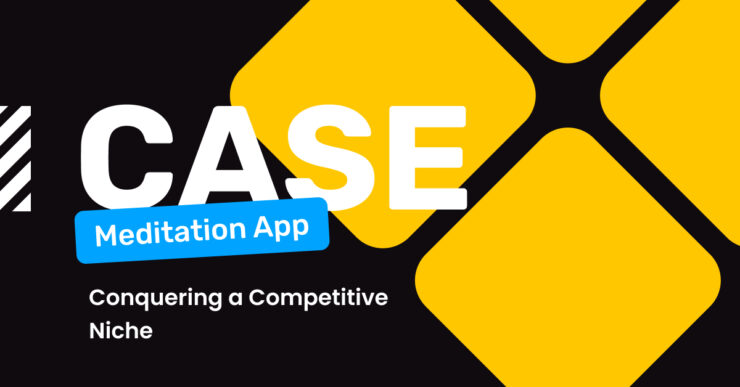How a targeted keyword promotion campaign propelled a meditation app to the top of the App Store.
Overview:
- Why Meditation Apps Are Competitive on iOS App Store
- Strategic Approach to iOS Keyword Promotion
- Case Study: Meditation App Success Story
- Key Insights and Algorithm Observations
- Best Practices for Meditation App Keyword Promotion
- Conclusion
In today’s competitive app marketplace, organic traffic remains the most valuable source of app installs due to its higher user loyalty and lower acquisition costs compared to paid user acquisition (UA). However, achieving organic visibility has become increasingly challenging, particularly in saturated markets like the wellness and meditation app category.
This case study demonstrates how strategic keyword promotion through Keyapp can dramatically improve app rankings and drive organic installs, using a meditation and sleep app as our real-world example. With over 9 years of experience in keyword promotion, Keyapp has successfully promoted numerous apps across various categories, and this meditation app case perfectly illustrates the effectiveness of our proven strategies.
Why Meditation Apps Are Competitive on iOS App Store
The meditation and wellness app category has experienced explosive growth, making it one of the most competitive niches on the App Store. To put this into perspective, according to Statista, revenue in the Meditation Apps market is projected to reach US$5.72bn in 2025.
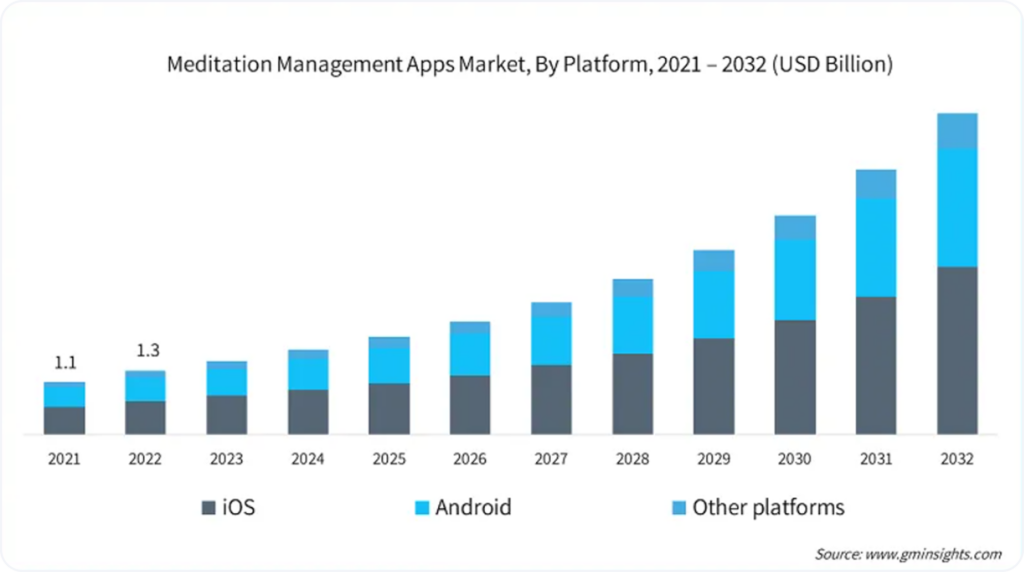
This immense market value is a key driver behind the fierce competition, as several factors contribute to this:
Market Demand and User Behavior
- Mental health awareness has increased significantly, with more people seeking digital solutions for stress, anxiety, and sleep issues
- The convenience of mobile meditation makes it accessible to users anytime, anywhere, eliminating barriers to traditional meditation practices
- Post-pandemic lifestyle changes have created a sustained demand for wellness apps that support mental health and better sleep
Developer Appeal
- High user engagement and retention rates make meditation apps attractive to developers
- With iOS’s built-in privacy safeguards, developers can create a secure space for users, protecting sensitive data to engage in meditation and mindfulness practices
- Subscription-based monetization models in this category typically show strong revenue potential
- The content can be scalable and evergreen, with guided meditations and sleep stories having long-term value
Competitive Landscape
- Established players like Headspace, Calm, and Insight Timer dominate high-volume keywords
- New entrants face significant challenges in achieving visibility for core terms
- Long-tail keywords offer opportunities for niche positioning and gradual market penetration
Strategic Approach to iOS Keyword Promotion
Based on our extensive experience with iOS App Store optimization, we’ve developed specific strategies that align with Apple’s algorithm preferences:
iOS-Specific Considerations
- Apple’s algorithm favors sustained, consistent promotional efforts over aggressive, short-term campaigns. We explore why this is the new standard, and how to adapt your strategy for 2025, in our recent article.
- Keyword relevance and app quality metrics play crucial roles in ranking stability
- iOS users typically show higher engagement rates, making ranking improvements more sustainable
Keyword Selection Strategy
- Focus on a mix of high-volume, medium-volume, and long-tail keywords
- Prioritize keywords that align with the app’s core functionality and user intent
- Consider seasonal trends and user behavior patterns in the wellness category
Case Study: Meditation App Success Story
Let’s take a look at the detailed results we achieved for a meditation and sleep app targeting the US market (en-US locale). This comprehensive campaign demonstrates how strategic keyword promotion can transform app visibility across multiple search terms.
Campaign Overview
App Category: Meditation/Sleep
Platform: iOS App Store
Target Market: en-US
Keyword 1: “meditation app” (High-Frequency)
Starting Position: #89
Target: Top 10 ranking
Campaign 1 Strategy: We initiated with a moderate approach to test algorithm response:
- Day 1: 100 installs
- Day 2: 150 installs
- Result: Position improved to #28 after stabilization (Day 4)
Campaign 2 Optimization: Based on positive initial results, we increased volume:
- Day 1: 200 installs
- Day 2: 250 installs
- Day 3: 320 installs
- Result: Achieved #10 position after stabilization (Day 5)
Maintenance Phase: To sustain the improved ranking:
- Days 1-4: 80-90 installs daily
- Final Result: Stable #10 position
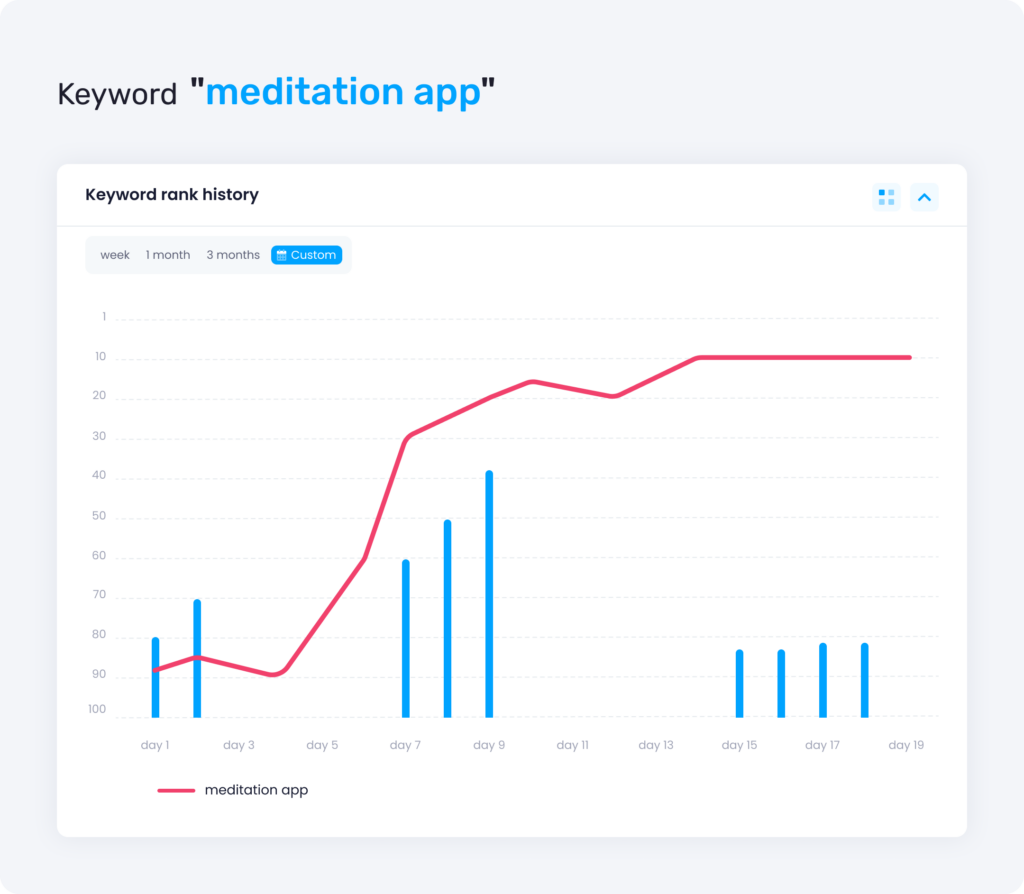
Keyword 2: “guided meditation for sleep” (Medium-Frequency)
Starting Position: #45
Target: Top 5 ranking
Campaign 1:
- Day 1: 100 installs
- Day 2: 150 installs
- Day 3: 200 installs
- Result: Position improved to #15 after stabilization
Campaign 2:
- Day 1: 250 installs
- Day 2: 250 installs
- Final Result: Achieved #3 position
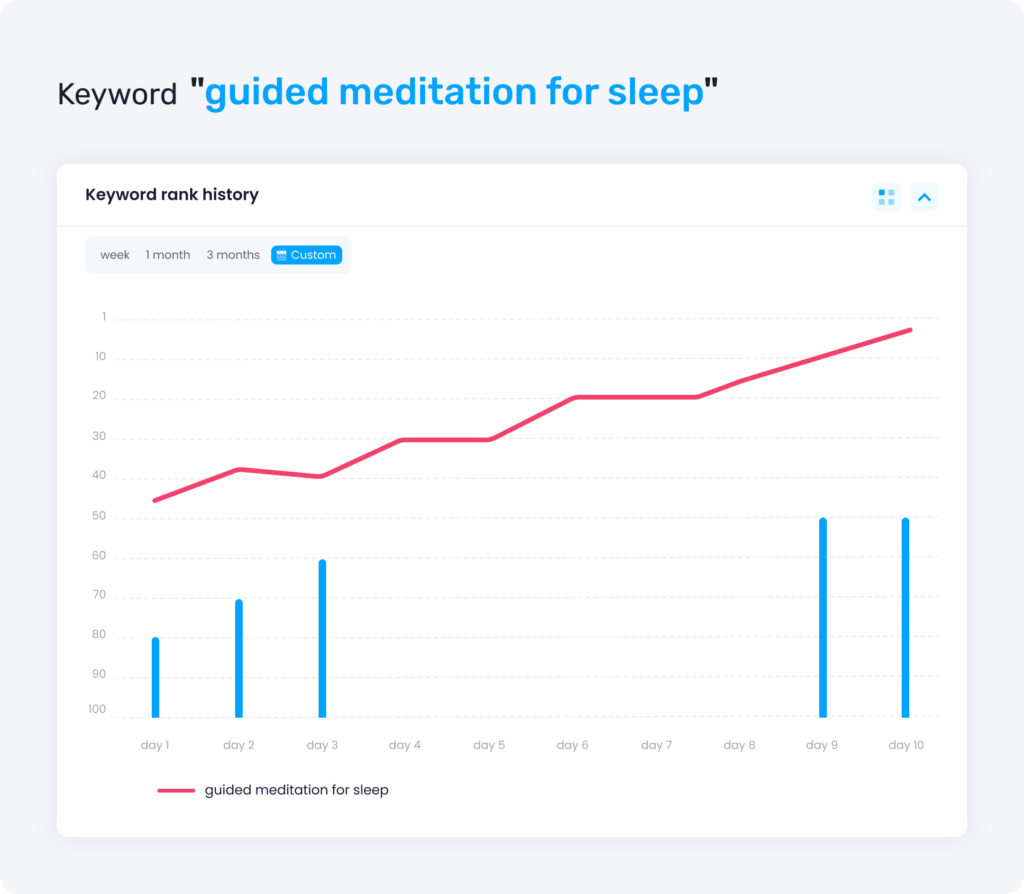
Keyword 3: “sleep music for adults” (Medium-Frequency)
Starting Position: #33
Target: Top 3 ranking
Campaign 1:
- Day 1: 120 installs
- Day 2: 180 installs
- Day 3: 250 installs
- Result: Position improved to #10 after stabilization
Maintenance Campaign:
- Days 1-4: 70 installs daily
- Final Result: Secured #2 position
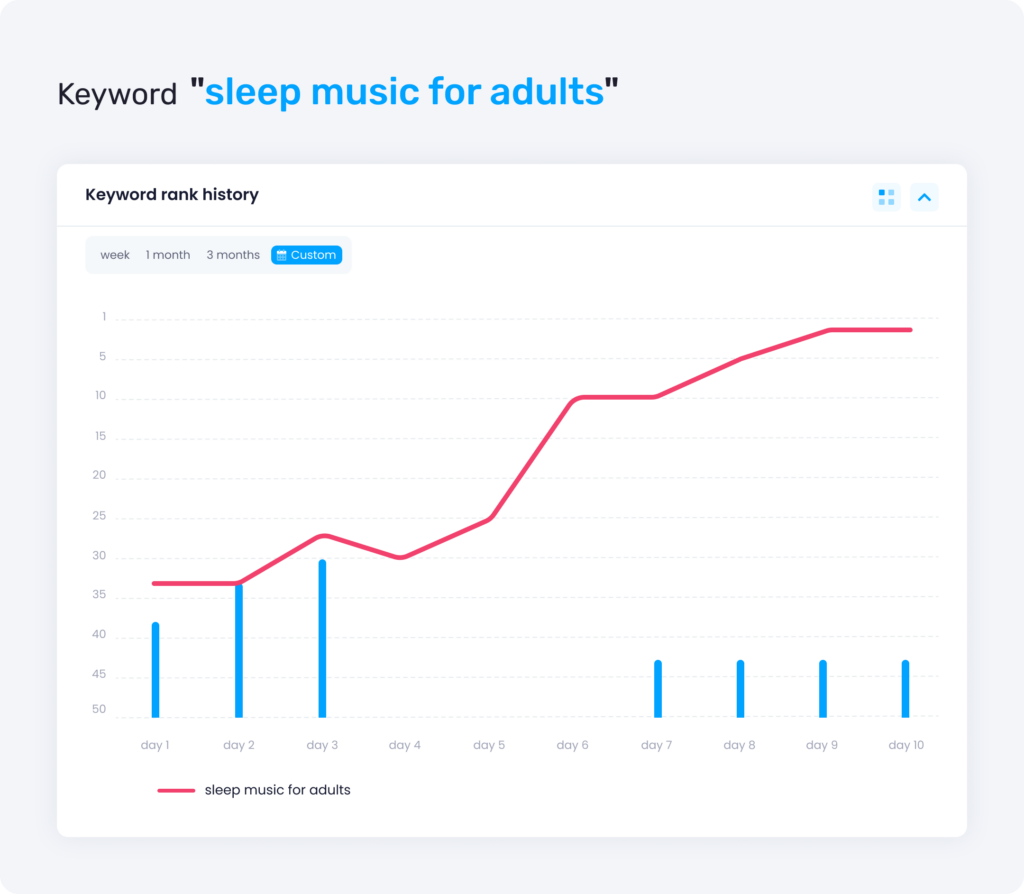
Keyword 4: “meditation for stress relief in 5 minutes” (Long-Tail)
Starting Position: #20 Target: #1 ranking
Single Campaign Strategy: Long-tail keywords require less aggressive promotion:
- Day 1: 50 installs
- Day 2: 80 installs
- Day 3: 120 installs
- Final Result: Achieved #1 position
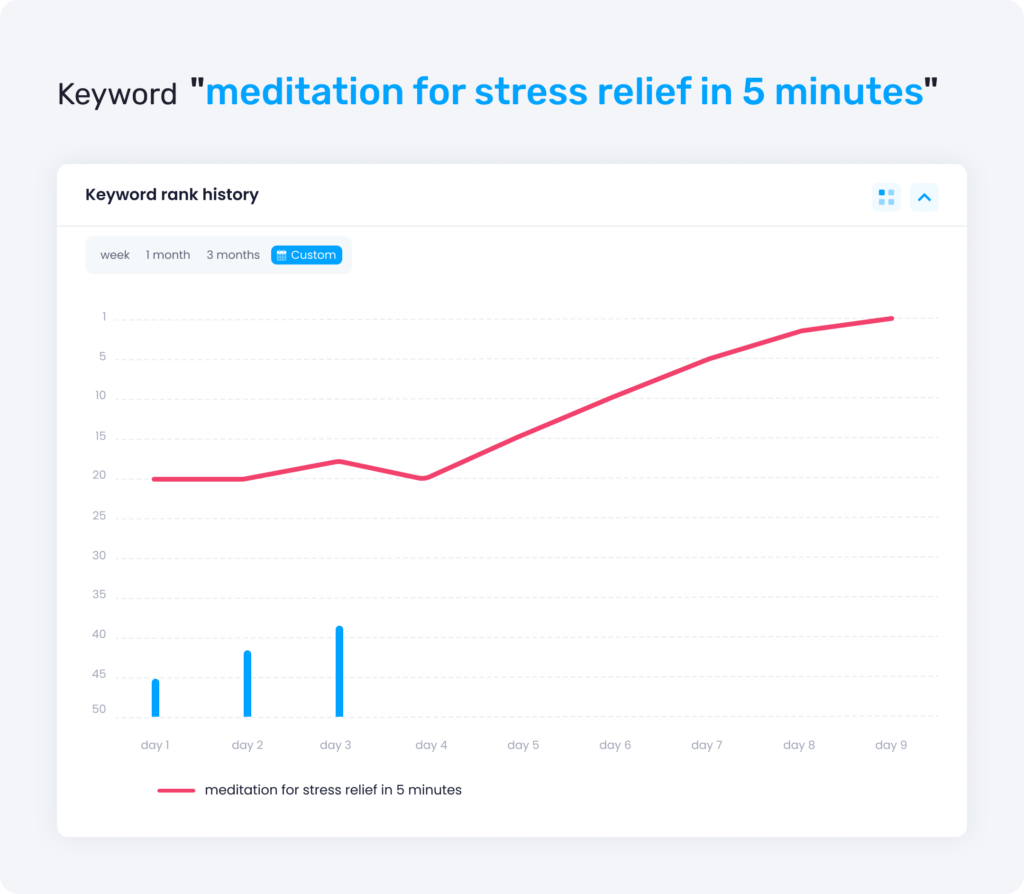
Key Insights and Algorithm Observations
iOS Algorithm Behavior
Throughout this campaign, we observed several important patterns in how the iOS App Store algorithm responds to keyword promotion:
Position Fluctuations: During active campaigns, positions typically fluctuate before stabilizing. This is normal algorithm behavior and shouldn’t cause concern.
Stabilization Period: Rankings usually stabilize 3-5 days after campaign completion, requiring patience for accurate result assessment.
Sustained Effort: Unlike some other platforms, iOS rewards consistent, moderate efforts over aggressive short-term pushes.
Quantitative Results
The meditation app campaign delivered exceptional results across all targeted keywords:
“meditation app”: #89 → #10 (79-position improvement)
“guided meditation for sleep”: #45 → #3 (42-position improvement)
“sleep music for adults”: #33 → #2 (31-position improvement)
“meditation for stress relief in 5 minutes”: #20 → #1 (19-position improvement)
Long-Term Benefits
The improved rankings created a compounding effect:
- Enhanced discoverability for related search terms
- Improved app store algorithm signals
- Higher conversion rates due to better positioning
- Increased user reviews and ratings from organic users
Best Practices for Meditation App Keyword Promotion
Pre-Campaign Preparation
App Store Optimization Foundation
- Ensure app metadata is fully optimized before starting campaigns
- Verify app quality and user experience meet App Store standards
- Implement proper analytics tracking for campaign measurement
Keyword Research
- Use professional platforms for comprehensive keyword analysis, for example, Keyapp.top has free unlimited keyword checking with real-time ranking data and traffic estimates. You can watch a detailed guide to all our free ASO tools in this video.
- Identify seasonal trends in meditation and wellness searches
- Analyze competitor keyword strategies for market gaps
Campaign Execution
Timing Considerations
- January (New Year resolutions) and September (back-to-school stress) show peak demand
- Avoid major holidays when app store activity decreases
- Consider time zone differences for global campaigns
Quality Maintenance
- Monitor app reviews and ratings during campaigns
- Ensure app performance remains optimal under increased usage
- Respond promptly to user feedback and issues
Conclusion
This case study demonstrates that strategic keyword promotion remains one of the most effective methods for improving app visibility and driving organic installs in competitive categories like meditation and wellness apps. The key to success lies in understanding iOS algorithm behavior, implementing appropriate volume strategies, and maintaining consistent efforts over time.
At Keyapp, we’ve successfully helped numerous apps achieve top rankings across various categories. Our approach combines data-driven strategies with deep understanding of app store algorithms to deliver sustainable results. Whether you’re launching a new meditation app or looking to improve existing rankings, our proven methodologies can help you achieve your organic growth objectives.
The meditation app featured in this case study now enjoys sustained top rankings, consistent organic traffic, and improved overall app store performance. These results showcase the power of strategic keyword promotion when executed with expertise and patience.
For apps in competitive categories, don’t hesitate to invest in professional keyword promotion services. The long-term benefits of improved organic visibility far outweigh the initial investment, creating a sustainable foundation for app growth and success.
Ready to boost your app’s rankings? Contact Keyapp’s expert team to develop a customized keyword promotion strategy that delivers results.

